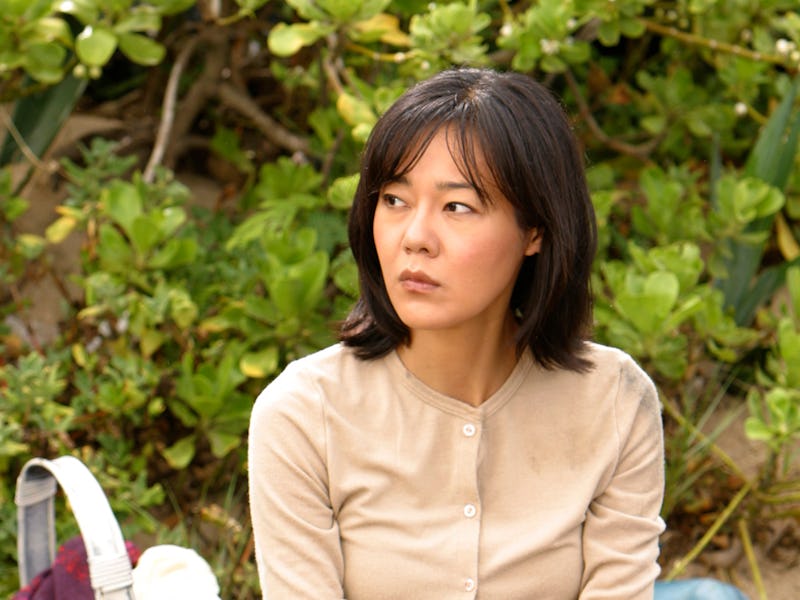Lost’s First Bid at Diversity Was Years Ahead of Its Time
Before the “Korean Wave,” there was “House of the Rising Sun.”

When Yunjin Kim, who played Sun Kwon in Lost, first read the pilot script for the ambitious ABC sci-fi show, she was concerned that the depiction of her meek Korean housewife “was really backward.”
In 2004, it was still relatively rare to have Asian characters, much less non-English speakers, be part of the ensemble of a mainstream network television show. Kim was concerned that the show would waste this opportunity for representation by giving into stereotypes of a submissive Asian woman and her hostile husband. But co-creator and executive producer J.J. Abrams eased her worries by sharing some of his plans for Sun, who would be revealed to have secretly learned English. Those plans wouldn’t come to fruition until the sixth episode of Lost Season 1, “House of the Rising Sun,” a sneakily groundbreaking episode in more than a few ways.
Airing on October 27, 2004, “House of the Rising Sun” boldly shifted attention away from Lost’s white leads — Jack (Matthew Fox), Kate (Evangeline Lilly), and Locke (Terry O’Quinn) — to a pair of characters we had never been able to understand. Sun and Jin (Daniel Dae Kim) were, up until that point, minor characters who were even more isolated from the band of airplane crash survivors because they didn’t speak English. When they spoke in Korean, their dialogue was only translated when they were alone.
“House of the Rising Sun” changed that when it focused its flashback story on the troubled married couple, revealing a time when they were head-over-heels in love. The plotline traced the secret romance between the wealthy Sun and lower-class Jin, up until Jin began working for Sun’s ethically dubious father, leading to a strain on their marriage that would end in Sun learning English in a scheme to flee her husband. The years-spanning flashback is packed with more story than any of the previous Lost Season 1 episodes focused around Jack, Kate, or Locke, delivering a classic melodrama filled with class conflict and gang-adjacent bloodshed.
Meanwhile, the episode’s island arc is similarly grounded in character conflict and drama, with Jack trying to move the survivors to the caves, while Michael (Harold Perrineau) and Jin get into a physical altercation (another racially loaded moment that the show surprisingly handled with care).
The conflict between Michael and Jin comes to a head in the island storyline of “House of the Rising Sun.”
It’s interesting to revisit “House of the Rising Sun.” In the decades since, an explosion of Korean cinema and pop culture has made this kind of story par for the course, but to have it play out on American network TV with subtitles was almost unheard of at the time.
Writer Javier Grillo-Marxuach, who didn’t speak the language and was worried he did not know enough about Korean culture to do justice to Sun and Jin’s story, wrote the script in English — which showrunner Damon Lindelof believed helped get the episode greenlit by executives. When the team showed the dailies to the network, Lindelof was worried that having an episode’s dialogue be mostly subtitled would backfire. Instead, it was well received.
“It was like, ‘Oh my God, this episode is going to be almost entirely subtitled. Are they going to freak out?’” Lindelof told Vox for a retrospective interview in 2014. “Then we sent in our cut [to the network], which was subtitled, of course, and they were like, ‘We love this episode! Oh my God, we really care about these people, and we're completely and totally engaged by it!’”
The episode was a low-key breakthrough moment in representation on network TV that arguably set the stage for the huge popularity of K-dramas and Korean movies today. Okay, maybe that’s a bit of a stretch, but it definitely preceded the “Korean wave” that came with the popularity of K-pop, K-dramas, and Parasite. To have a storyline centered around a Korean couple with mostly subtitled dialogue would be accepted without fuss on any streaming or network show in 2024, but in 2004 it was truly historic. It set up Lost to be a new bastion for representation and diversity on network TV, even if it sadly never lived up to that.